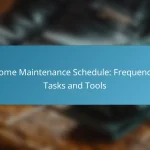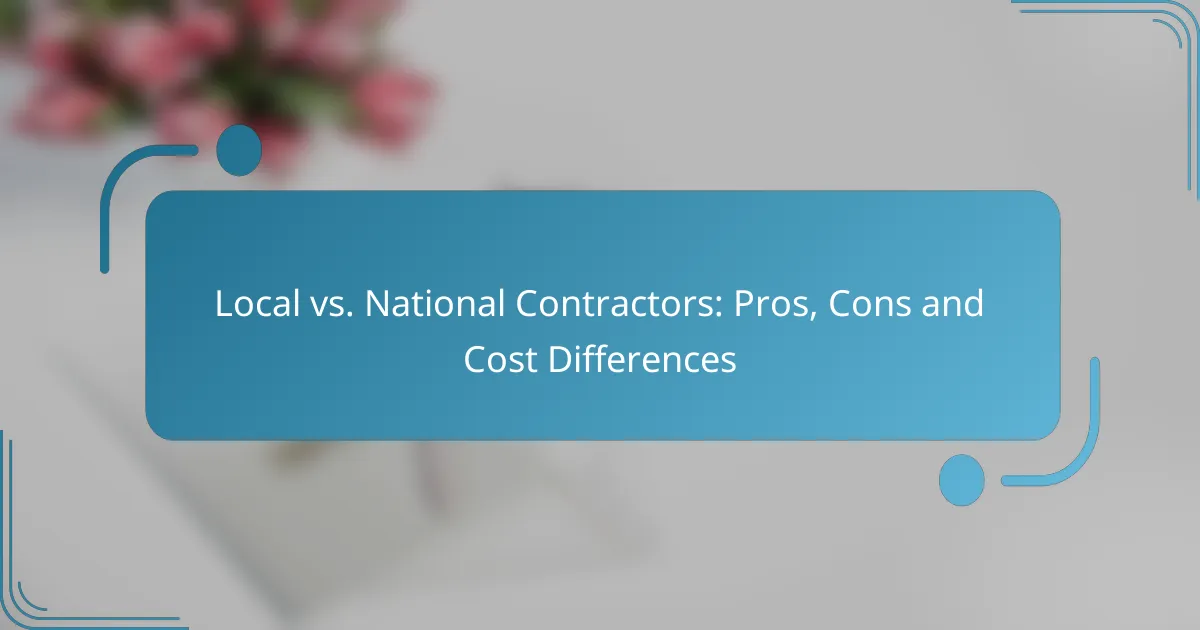When hiring a contractor, it’s essential to understand that fees can vary widely based on factors such as location, project complexity, and the contractor’s experience. While hourly rates may range from the low twenties to over a hundred dollars, hidden costs like permits and material markups can significantly affect your overall budget. By being aware of these variables, you can better anticipate expenses and make informed decisions throughout your project.

What are typical contractor fees in major US cities?
Contractor fees vary significantly across major US cities, influenced by factors like local demand, cost of living, and the type of work being performed. Generally, hourly rates can range from the low twenties to over a hundred dollars, depending on the contractor’s expertise and the project’s complexity.
Average hourly rates in New York
In New York City, average contractor fees typically range from $50 to $150 per hour. This variation depends on the contractor’s specialty, with skilled trades like electrical or plumbing work often commanding higher rates.
When hiring a contractor in New York, consider additional costs such as permits and materials, which can significantly affect the overall project budget. It’s advisable to obtain multiple quotes to ensure competitive pricing.
Average hourly rates in Los Angeles
Los Angeles contractors generally charge between $40 and $120 per hour. Rates can fluctuate based on the contractor’s experience and the specific services required, such as renovations or new constructions.
Be aware that in Los Angeles, the cost of materials and labor can be higher due to the city’s robust construction market. Always clarify what is included in the quoted rate to avoid unexpected expenses.
Average hourly rates in Chicago
In Chicago, contractor fees usually fall between $30 and $100 per hour. The lower end of this range often includes general labor, while specialized services may reach the higher end.
As with other cities, it’s crucial to factor in potential hidden costs such as travel fees or additional charges for overtime work. Requesting a detailed estimate can help you manage your budget effectively.

What factors influence contractor fees?
Contractor fees are influenced by several key factors, including project complexity, contractor experience, and location along with market demand. Understanding these elements can help you anticipate costs and make informed decisions when hiring a contractor.
Project complexity
The complexity of a project significantly impacts contractor fees. More intricate tasks, such as custom builds or renovations requiring specialized skills, typically demand higher rates due to the increased time and expertise involved. For example, a simple paint job will cost less than a full kitchen remodel.
When assessing project complexity, consider the scope of work, necessary permits, and potential challenges that may arise. A detailed project plan can help clarify these factors and provide a more accurate estimate of costs.
Contractor experience
Contractor experience is another crucial factor that affects fees. Seasoned contractors with a proven track record often charge higher rates due to their expertise and reliability. They can navigate challenges more efficiently, potentially saving you time and money in the long run.
When selecting a contractor, weigh the benefits of hiring an experienced professional against the potential savings of a less experienced one. While the latter may offer lower fees, they might lack the skills to handle unexpected issues effectively.
Location and market demand
Location and market demand play a vital role in determining contractor fees. In areas with high demand for construction services, such as urban centers, fees tend to be higher due to competition and increased living costs. Conversely, rural areas may see lower rates due to less demand.
It’s essential to research local market conditions and compare quotes from multiple contractors in your area. This can help you gauge reasonable pricing and ensure you’re not overpaying for services. Additionally, consider seasonal trends, as demand can fluctuate throughout the year, impacting contractor availability and pricing.

What are common hidden costs associated with contractors?
Common hidden costs associated with contractors can significantly impact your overall project budget. These costs often arise unexpectedly and can include fees for permits, material markups, and change orders, which may not be clearly outlined in the initial contract.
Permit fees
Permit fees are charges required by local governments to ensure that construction work complies with building codes and regulations. These fees can vary widely depending on the project type and location, often ranging from a few hundred to several thousand dollars.
Before starting a project, it’s crucial to check with your local municipality to understand the specific permit requirements and associated costs. Failing to obtain necessary permits can lead to fines or the need to redo work, adding to overall expenses.
Material markups
Material markups refer to the additional charges contractors may apply to the cost of materials. This markup can vary, typically falling between 10% to 30% over the wholesale price, depending on the contractor’s pricing strategy and the materials used.
To avoid surprises, ask for a detailed breakdown of material costs in your contract. Comparing prices from suppliers can also help you gauge whether the markup is reasonable.
Change order fees
Change order fees occur when modifications to the original project scope are requested after work has begun. These fees can include administrative costs and additional labor, often resulting in a price increase of 10% to 20% or more, depending on the complexity of the changes.
To minimize change order fees, clearly define the project scope in the contract and communicate any potential changes early. Document all requests and approvals to ensure transparency and avoid misunderstandings that could lead to additional costs.

How can I estimate total contractor costs?
Estimating total contractor costs involves considering various factors such as labor, materials, and potential hidden fees. A comprehensive approach includes detailed planning and comparison of multiple quotes to ensure accuracy and avoid unexpected expenses.
Using a detailed project scope
A detailed project scope outlines all tasks, materials, and timelines, providing clarity on what is needed for the job. This document serves as a foundation for accurate cost estimation, helping to prevent misunderstandings with contractors.
When creating a project scope, be specific about the desired outcomes, materials, and any special requirements. For example, if renovating a kitchen, include specifics like cabinet types, countertop materials, and appliance brands to ensure all quotes reflect the same expectations.
Comparing multiple quotes
Comparing multiple quotes is essential for understanding the range of contractor fees and services offered. Aim to gather at least three quotes from different contractors to identify the average cost and spot any outliers.
When reviewing quotes, look beyond the total price. Analyze the breakdown of costs, including labor, materials, and any additional fees. This will help you identify which contractor offers the best value for the services you need.
Including contingency funds
Including contingency funds in your budget is a smart strategy to cover unexpected costs that may arise during a project. A common recommendation is to set aside 10-20% of your total budget for contingencies.
This fund can address unforeseen issues like structural repairs or changes in material prices. By planning for these possibilities, you can avoid financial strain and keep your project on track.

What should I consider when hiring a contractor?
When hiring a contractor, it’s essential to evaluate their qualifications, experience, and the overall cost of the project. Understanding the potential variability in contractor fees and any hidden costs can help you make an informed decision.
Checking references and reviews
Before hiring a contractor, checking their references and reviews is crucial. Look for feedback from previous clients to gauge their reliability, quality of work, and professionalism. Online platforms and local directories can provide insights into their reputation.
Ask for at least three references and follow up with them. Inquire about the contractor’s ability to meet deadlines, stay within budget, and communicate effectively throughout the project. This step can help you avoid potential pitfalls.
Understanding contract terms
Understanding the contract terms is vital to ensure clarity and protect your interests. Review the scope of work, payment schedule, and any warranties or guarantees offered. A well-defined contract can prevent misunderstandings later on.
Pay attention to clauses regarding change orders, which outline how additional work will be handled and billed. It’s also wise to clarify the timeline for project completion and any penalties for delays. Ensure that all verbal agreements are documented in the contract to avoid disputes.










